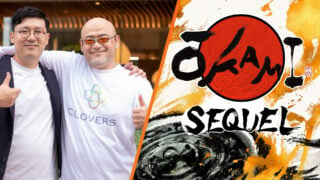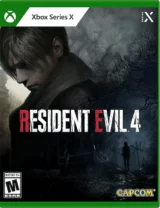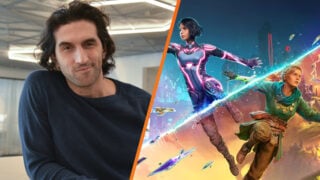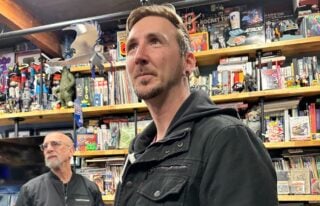A message from the director of the project, Hideki Kamiya!
— Okami (@OkamiOfficial) December 13, 2024
Find more info here:https://t.co/JgFR8F9Mnx#Okami #Okami_sequel pic.twitter.com/X8G5p2g3Qa
INTERVIEW: Hideki Kamiya on returning to his roots with Clovers and Okami 2
The acclaimed designer tells VGC about his new studio, plans for the future, and why he left Platinum

The secret is out: a year after his shock departure from PlatinumGames, acclaimed action game creator Hideki Kamiya is back with a new venture – and he’s returning to his roots.
Announced in dramatic fashion at The Game Awards, to the sound of a taiko drummer and full orchestra no less, it was revealed that Kamiya is working with former employer Capcom on a sequel to his beloved 2006 adventure game Okami – truly dream stuff for fans.
But the Game Awards teaser left the audience with many questions: Who exactly is working on the sequel? Why has it taken 18 years for it to be greenlit? And why did Kamiya have to end his near-two-decades at Platinum, the studio he co-founded, to get it off the ground?
So far, all we know from the official announcement is that Kamiya has founded a new studio called ‘Clovers Inc’, based in Osaka and Tokyo, to develop the game, which he claims was started with joint funds from himself and business partner Kento Koyama, with no investment from outside parties.
The studio’s name is clearly influenced by the long-closed developer of the original Okami, Clover Studio, where Kamiya also directed the Viewtiful Joe games, though the designer says it also nods to his first team at Capcom, where he directed Resident Evil 2 and Devil May Cry.
“Clover Studio is a milestone in my career that I can’t overlook,” Kamiya explained in a meeting with VGC ahead of the announcement. “It was a company founded by former members of Capcom’s Division 4, built on the creative philosophy that [co-founder, Resident Evil creator] Mr. Mikami valued deeply. I’m still proud to have been part of that team. Though many years have passed since Clover Studio ceased to exist, the creative principles we held at the time remain just as important to me today.”
He added: “The number ‘4’ represented by the four-leaf clover in the Clovers emblem holds a special meaning for me personally. It is the same important number as the ‘4’ from Capcom’s Division 4 during my time there. So, the name ‘Clover Studio’ isn’t about looking back with nostalgia. It’s about staying true to the values I’ve carried throughout my 30-year career. Those values have always been my foundation, and they’ll continue to guide me.”
From Platinum to Clovers
Kamiya left PlatinumGames last October, after a three-month notice period that began, coincidentally, nearly exactly after I last visited the company to interview him. At this point, the designer wasn’t sure what he would do next, he said, until an intervention from his colleague Kento Koyama, co-director of 2021’s World of Demons and another “certain project” with Kamiya, convinced him to start a new company.

“I was the lead game designer for a certain project that Kamiya was directing,” Koyama said, almost certainly referring to the superhero title Project G.G. “[Conversations started] after I heard that he was going to quit Platinum. So it was last year, in July.”
Kamiya explained: “I announced my decision to quit at that time, but I didn’t actually leave the company until October. In the months leading up to my departure, I spent time wrapping things up and using my remaining leave. During this period, Koyama approached me”.
He added: “We were working on a certain project, and Koyama was also on that team. He asked me, ‘Now that you’re quitting, what are you going to do moving forward?’ I wasn’t exactly sure. So he said, ‘If you’re not sure, then why don’t we start a game development company together?’
“It was quite sudden, so I didn’t really think about it seriously. But then others in Platinum came up to me and said, ‘I’m really sad that you’re quitting’, and there were more people than I expected. So I thought maybe I should continue in some capacity, like doing freelance or working by myself making games.
“Clover Studio is a milestone in my career that I can’t overlook. It was a company founded by former members of Capcom’s Division 4, built on the creative philosophy that Mr. Mikami valued deeply.”
“But then, since people were reaching out to me to work together, I felt that I should explore ways to create an environment where I could work with them. That’s when I started to consider Koyama’s proposal seriously.”
After quitting Platinum, Kamiya wasn’t contractually able to work for a year, as is standard for high-profile employees quitting their jobs in the games industry. During that time, Koyama laid the groundwork by himself as Clovers Inc.’s appointed president, establishing the business and bringing together a team. Outsiders might be surprised that Kamiya himself didn’t decide to run the new company, but he said that particular decision was straightforward.
“I’m a game developer, and my skill is making games. I can’t run a company,” Kamiya said. “It’s not that I randomly picked Koyama because no other people approached me. I had worked with Koyama previously, and I knew that he was good at managing, working with money, and managing people. I knew from experience that he could do it.”
Koyama added: “I was a lead game designer, so I worked on a team with other game designers. That kind of management skill, I think, is what Kamiya-san saw in me.”
Kamiya on the 'Clovers' name
“Our company’s name was inspired by specific concepts that start with the letter C. So, you’ll see that our symbol here is four Cs that come together. Each C has a specific meaning.
“This idea was developed thanks to Koyama. The first C stands for ‘challenge,’ as continually taking on challenges is a core principle for us. The second is creativity. Creativity is, of course, the most important thing for us. The third is craftsmanship, which emphasizes our dedication to quality and detail.
Then, for the fourth C, there were so many good words to choose from that we couldn’t settle on just one. Koyama had the idea to give each employee their own C, based on what they consider to be important. So each employee will have their own C.”
Kamiya claimed that some of his former Platinum colleagues even told him that, if he were president, they wouldn’t consider joining the new venture – a notable comment, considering his final years at Platinum were spent as its vice president.
“There were certain people who wouldn’t have come to my company if I were president,” he said. “I only think about making games. I don’t know if the company is profitable or if the management is going well. In fact, many of the members who have joined us likely wouldn’t have if I were president of the company. They understand that my strengths lie in game development, not in handling the business and management aspects. Some people said that Koyama’s assumption of the presidency convinced them to join us.”
He added: “Just to clarify my position, I’m the studio head and chief game designer. That means I’ll direct some games and oversee all development. I’ll also assess the quality and whether or not the game is interesting and offer advice to the different teams. That’s the skill set I want to bring to the table.”
With plans for Clovers Inc. in place, attention turned to what kind of game the new studio was going to work on. Kamiya claims there was no offer in place at the time he decided to quit PlatinumGames, but soon, the opportunity to work on Okami emerged following conversations with old friends.

“After I talked with Koyama and we decided to create this new company, the question became, ‘what are we going to do? We need to find work.’ So, I spoke with my acquaintances and connections in the industry, and we were able to find a client who made us an offer.”
‘The most important thing is mindset’
Today, Clovers has around 25 people spread across Tokyo and Osaka offices. Kamiya said the plan is now to expand the team as it gears up for full production on Capcom’s Okami sequel. However, the designer is clearly mindful of not bloating his next venture into something that will impact the spirit in which it was created – that of the original Clover Studio, which made games with a core team of around 70 people.
“For me, the most important thing isn’t building a huge company with lots of people—it’s ensuring that everyone shares the same mindset,” Kamiya said. “I want to work with those who are truly passionate about creating something great, true creatives who can develop games with a strong core.
“If there are times when we don’t have enough people to handle the workload, we’ll outsource some of the smaller tasks. This way, each core creative member can focus on their speciality as we move forward with the game.”
For the Okami sequel, the game’s teaser trailer revealed that Clovers is working with M-Two Inc and Machine Head Works – two studios co-founded by former PlatimumGames CEO Tatsuya Minami, the former of which created the HD version of the original Okami for modern platforms.
“For me, the most important thing isn’t building a huge company with lots of people—it’s ensuring that everyone shares the same mindset”
Unsurprisingly, Kamiya and Koyama said that most of Clovers’ staff so far followed them from Platinum. Although they wouldn’t name specific people, knowledgeable fans will be able to spot some notable faces in Clovers’ team photo, such as cinematic director Kunihiko Tsuda, who worked on the cut-scenes for the original Okami, Devil May Cry, Bayonetta, Astral Chain, and more. Metal Gear Rising’s lead animator, Hirokazu Takeuchi, is also there, alongside Bayonetta series animator Rei Yamamoto [UPDATE: Clovers has told VGC Takeuchi is currently not working with the new company, though he has left Platinum].
“Many of our team members come from PlatinumGames. These are people who have worked with me or with Kamiya during our time there,” Koyama explained. “So most of our employees share this connection to Platinum. They’re individuals who share a similar mindset. They were those who expressed a desire to continue working with us. But while most are from Platinum, several team members are acquaintances of mine from other companies and elsewhere.”
Kamiya added: “They’re not people who were fired from Platinum. They’re people who wanted to work with us, those who approached us and wanted to go down the same road as us. So it’s not that we encouraged anyone to quit. Our team members are comprised of people who, of their own volition, said that they wanted to join us.”
The pair would not specify how many of Clovers’ employees were previously members of their last development team, which was working on Project G.G., or indeed confirm whether that project is still in development (“direct that question to Platinum”). Kamiya said they were individuals he respected for their individual talents.

“I can’t give you a specific number [of who joined from Project G.G], and honestly, I’m not sure I even know the exact number of people who worked on Project GG,” he said. “I wasn’t particularly conscious of who was on my project. As the chief game designer at Platinum, my role was to oversee game development on a company-wide level.
“However, while working with different team members, I came to appreciate certain individuals for their exceptional talents—whether as animators, VFX experts, or creative minds that resonated with me. As I shared information with those talented individuals, some expressed an interest in working with me, and we were fortunate to have them join us.”
‘If I was satisfied, I wouldn’t have left’
It’s fair to say that Kamiya’s Platinum exit came as a shock to most outside onlookers. For nearly two decades, the Bayonetta and Wonderful 101 director was the studio’s creative leader, its vice president, and the recognisable face of the company. Up until the point of his resignation, Kamiya and Platinum felt intertwined and inseparable.
Although the designer has never given an explicit explanation for why he decided to quit, he’s hinted at cultural changes at the company which didn’t align with his philosophy for creating games. In our latest meeting with the designer, he again wouldn’t be drawn on specific issues he had with his former company, but reiterated it was a decision motivated by his personal beliefs on how games should be made.
“If I was satisfied at Platinum, then I wouldn’t have left,” he said. “There’s a way I believe games should be made: a philosophy, a mindset of how games should be made. Koyama approached me, and we shared the same mindset and philosophy about game development.
Kamiya on leaving Project GG
“I absolutely feel the same way about Project GG [as I did with Scalebound]. It’s unfortunate, like with Scalebound. I believe Scalebound would have been a really fun game if it had been released, and the same goes for Project GG. We truly believed that it would be a great game, and so now that I’m not a part of it, I do feel it’s unfortunate that I wasn’t able to see it through to its final release.”
“So, it was just us two together, but then, of course, a number of individuals felt the same way. That’s what led to the start of [Clovers]. I began my career at Capcom and then moved to Platinum, but my mindset for game development has remained the same throughout these transitions and throughout my career.”
Although Kamiya hasn’t directly criticised his former company, it’s easy to see how some could interpret the ‘Clovers’ name as a thinly veiled jab at his former employer. After all, Platinum’s CEO is Atsushi Inaba, co-founder and leader of Clover Studios before its closure. It’s also difficult to imagine that the number of Platinum employees who have jumped ship to the new company will have gone down well.
At the time of VGC’s interview, before The Game Awards announcement, Kamiya said he hadn’t given Platinum advance notice of his plans. “We haven’t shared the details of what we’re doing or working on with them,” he said. “But of course, it wasn’t like we had a big fight or a big falling out. So, our relationship is just a flat one.”
Asked if he was concerned that Platinum might react negatively to Clovers, especially considering it was actively hiring former employees, Kamiya said he was more concerned for the future of his former team members there.

“If there was one thing I am worried about, it’s the fact that I was VP and chief game designer of PlatinumGames. And so with me quitting, I worry about the people there, the staff there,” he said.
“Of course, if they’re motivated and happy at Platinum, I believe that’s the right path for them. But if there are others whose mindset aligns more with what we’re building here at Clovers, we want to welcome them and provide a path for them, too. I see that as a responsibility I have to those people after leaving Platinum.”
For many fans, the saddest part of Kamiya’s separation from the studio he co-founded is the likely end of his relationship with the franchises he created, even if the rights of most, like Bayonetta, are reportedly split between several parties.
Theoretically, the designer said he would be open to collaborating with Platinum in the future, “provided it’s a situation in which we can take on the job”. He said: “So, of course, that’s not our decision to make, but if an offer comes our way that we find interesting, we will definitely consider it.”
“If there was one thing I am worried about, it’s the fact that I was VP and chief game designer of PlatinumGames. And so with me quitting, I worry about the people there, the staff there”
Speaking more generally on the types of projects Clovers will take on, he added: “What we want as a strength of our studio is not simply following orders like, ‘yeah, make this,’ and just doing as we’re told. Instead, we want to build a studio capable of creating games from zero, starting with completely original ideas, and presenting and pitching them ourselves.
“Of course, we’re open to offers if the project aligns with our interests. However, we want to be a studio that can accept such offers while also creating fully original games from scratch.”
‘I’m really looking forward to our game’
Kamiya and Koyama couldn’t disclose any details on their Okami sequel, owing to the fact the IP is very much owned and operated by Capcom, but the pair did share their excitement over the prospect of building a new game from scratch in an environment shaped in their mold.
“We didn’t tell our new members, like, ‘oh, come work with us’,” Koyama said. “We said, ‘this is the kind of company we’re making’ and they said, ‘well, if that’s the kind of company you’re making, then we want to be a part of it’. I’ve managed teams in the past, but this level of people with a high mindset, where everyone’s focused and top-tier talent is all on the same page, is my first time experiencing that kind of team, so it’s very exciting for me.”
Kamiya added: “I’m really looking forward to our new game. This company started from nothing, just Koyama and me. That includes where we’re going to put our office, what the layout is going to be… truly from nothing. Of course, the end goal of that is to make games, but just bringing people together and starting this company from nothing is also what’s really exciting for me.”









